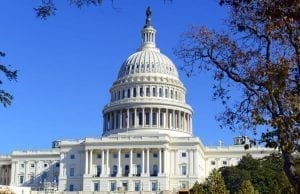In 2017, Republicans handed the Internal Revenue Service a huge task. In 2018, Congress is about to send home much of the agency’s workforce.
The architects of the recently passed Republican tax law are relying on the tens of thousands of IRS employees to turn their new vision for the tax code into reality.

IRS attorneys have to issue new guidelines to resolve legal questions unresolved by the legislation. Computer programmers have to update IRS software for processing tax forms. Call centers have to answer questions from confused taxpayers.
But now the IRS, like the rest of Washington, faces the threat of a government shutdown — one that would deprive the federal agency about 56 percent of its workforce, according to the U.S. Treasury, just as that workforce is needed for one of its biggest jobs in decades. Tax experts and former IRS officials are warning that a prolonged shutdown could exacerbate the challenge the already-strained agency faces in implementing the complicated new GOP tax law.
“They have so much to do already: You’re losing precious time in terms of getting important information to taxpayers,” said Mark W. Everson, who served as commissioner of the IRS from 2003 until 2007 and now works at the tax consulting firm alliantgroup. “A shutdown would certainly be frustrating at the time you’re trying to get on top of the new statute, and every day counts.”
Beset by budget cuts over the last several years, the IRS already faced a last-minute scramble to give taxpayers guidance on dozens of new policies in the GOP tax law that in some cases are already in effect. The agency has shed about 18,000 full-time employees amid a more than $900 million budget cut since 2010, leading even conservative Republicans who have traditionally sought to cut the IRS budget to say earlier this month that they want to increase it to ensure a successful implementation of the tax law.
But amid stalled talks over government spending levels, that additional funding is nowhere in sight. Instead, as of Friday morning, lawmakers on Capitol Hill had failed to come to an agreement over a variety of other issues. Congress has until midnight to approve a spending deal and avert a potential shutdown.
The length of the potential shutdown would have a big impact on its severity on the IRS. A shutdown of a few days, or even a full week, may not create too much additional pressure on the IRS’s ability to implement the tax law, according to tax experts. And while all the experts cautioned that the IRS was already burdened, others downplayed the impact on its ability to implement the tax law specifically.
“Very few of the regulations are really that time-sensitive — if employers implement new withholdings in March instead of February, the world does not end,” said Mark Mazur, who served as director of research, analysis, and statistics at IRS.
But companies and taxpayers will be impatient for clarifications from the federal government about a range of questions, and any lengthy delay could prolong the existing confusion about the new law’s provisions. Brian Newman, a partner at the tax consulting firm CohnReznick, said he has been inundated with questions from confused business owners. He says some want to know under what conditions so-called pass-through corporations can qualify for the new 20 percent deduction now offered on business income, a provision that has already taken effect. Others are curious when real estate owners can claim a more robust deduction on interest expenses for their businesses.
“There are some really big provisions we need guidance on,” Newman said.
Then there’s the question of how universities and colleges will be hit by a new college-endowment tax, with the Wall Street Journal reporting that schools are looking toward the IRS to clarify exactly how much they will owe in additional taxes. Another provision limits firms’ ability to deduct for meal expenses, but the IRS hasn’t clarified under what circumstances.
The longer the shutdown, the worse the IRS’s implementation of the law is likely to be, experts said. “There’s going to be errors — the forms won’t look good; they won’t have answers to basic questions; the list goes on,” said Philip Hackney, a tax expert at Louisiana State University. “People are going to be looking to understand just what the heck this means.”
Previous government shutdowns may offer an imperfect gauge of their impact on the IRS. The government has never previously shut down amid the implementation of a massive overhaul of the tax code, and it has never shut down during tax filing season, either, although one in 1996 came close.
“This is going to be terrible — there are so many questions, and I don’t think the IRS will have all the answers,” said Marvin Friedlander, who spent 40 years at the IRS before retiring in 2010. “And the people who need to develop guidance will instead be at home.”
Original Article: Congress asked the IRS to implement a massive new law. Now it could send more than half its workers home.
By Jeff Stein
The Washington Post
https://www.washingtonpost.com/news/wonk/wp/2018/01/19/congress-asked-the-irs-to-implement-a-massive-new-law-now-it-could-send-90-percent-of-its-workers-home/
